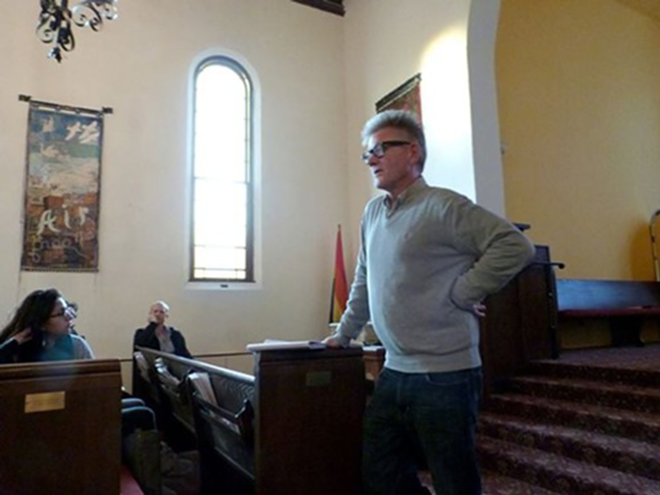St. Pete sizzles with synergy these days. The word is derived from a Greek word, synergia, which literally translated means “working together.” And, working together for the common good is what leaders in the Sunshine City say it's all about.
On Jan. 22, the new St. Petersburg Sustainability Council met for the first time at the USFSP ballroom.
The campus is located on Bayboro Harbor and is the natural choice for the Sustainability Council. It houses USF‘s premier graduate program, Marine Science, internationally renowned for its on-going research in the Gulf of Mexico.
68 citizens turned out to help “create a sustainable St. Petersburg.” Among the participants were City Council members Darden Rice, Karl Nurse, Amy Foster and Steve Kornell. Deputy Mayor Kanika Tomalin and Mike Connors, public works administrator for St.Pete, also attended.
Cathy Harrelson, the organizer-in-chief, said that the organizing principle of the Council is, “Meeting the needs of the present without sacrificing the needs of the future.” She went on to say that in-as-much as, “St. Pete is ‘water-locked,’ that’s a primary driver. It puts us in the bull’s eye of climate change and sea level rise — we don’t have time for the deniers.”
The Sustainability Council is not a city task force; it is made up completely of volunteers.
Harrelson pointed out that St. Pete passed a resolution last June which stated that the city recognized a need for collaboration to create sustainable systems and that the city is a big player in their overall plans.
She admitted that there are some disadvantages to being an independent organization.
Since the Council is not a sunshine law organization they may not receive public money, but, she said, “Our members are free to meet with one another and have a free exchange of ideas.”
“People know we are out here and we need to continually explore and look at systemic changes in key areas: the built environment, mobility, health and community. Our projects include increasing energy efficiency and related jobs, urban agriculture, training and education.”
She went on, “We are looking at efficiency of thought and action. We need to work together. We no longer want to work in silos.”
St. Petersburg Preservation (SPP), another all-volunteer organization, introduced its new President, Emily Elwin, at the City Council meeting on January 23, bidding farewell to out-going President, Peter Belmont who is now serving in the role of Interim Vice President.
SPP shows movies in Straub Park in May and October and holds various walking tours of the city once a month.
In April they will be holding four unique tours — one each Saturday to coincide with International Conference of Community Archaeology in late April.
The group’s lecture series which was originally funded by the Florida Humanities Council has grown and they now charge a nominal admission fee of $10 and meets at various historic locations throughout the city. The popular porch parties are held at restored residences throughout St. Pete.
Elwin encouraged the Council to direct the marketing department to promote historic hotels, like the recently restored Birchwood on Beach Drive.
She also pointed out that the historic 50-year mark is now 1964, and urged the city to expand and market tax abatement incentives for historic preservation, noting that properties with historical designation are less vulnerable to market pressure.
Meanwhile St. Pete’s most visible civic group, the People’s Budget Review (PBR) kicked off its year at the Unitarian Universalist Church on Arlington Ave N. with about 50 participants.
Aaron Dietrich kicked off the discussion stating that St. Pete’s participatory budget process was moving in a new direction.
- Lorraine Margeson
- Rick Smith answers questions at PBR's kickoff
He then passed the floor to Rick Smith who introduced ‘direct democracy’ saying, “Participatory budgeting puts residents in the driver’s seat…we are at a historic moment in time, not another city had done this the way we are going to do it.”
Smith then explained, using Vallejo, CA — a city with a similar resolution — as a reference, that PBR would be asking the City to earmark 1-4 percent of the total city budget for neighborhood projects. The money would be given directly to the groups.
True to the ideal of participatory budgeting and direct democracy, questions about how to stem corruption and how to best organize neighborhoods arose.
St. Pete is comprised of about 100 neighborhoods with only an estimated 55 currently participating in South Pinellas Council of Neighborhoods, an organization besieged with on-going conflicts.
Smith admitted that he did not have all the answers.
Christian Haas, one of the group’s organizers stepped up and said, “[Those question] just challenge us to become better organizers.”
Barely a month into the New Year and already St. Pete has launched a new environmental group, scheduled entertaining and educational events and rolled out a radical budgeting plan.
That is synergy. That is St. Pete.


